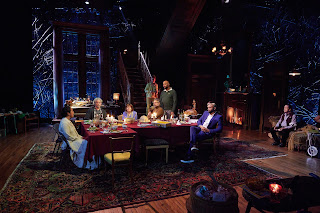Visually, Epiphany, at the Mitzi E. Newhouse Theatre, is an A+. Unfortunately Brian Watkins’ play is not. Obscure is a word I would use. That might be one of my kindest descriptions.
John Lee Beatty’s set readied me to get into the show, at least I thought it did. The Playbill describes the setting as a “very old house, on the banks of a large river, just north of a big city.” Beatty captured this through wood paneled walls, a fireplace with a comfy fire, slightly worn Oriental rugs, an upright piano, side tables holding glasses and candles, a well-stocked bar cart and stairs going to the dark, unseen upstairs and the unseen front door downstairs.
Floor-to-ceiling windows on two sides reveal wooded surroundings and snow falling steadily. Wind is heard and the curtains blow. Isabella Byrd’s lighting creates that peaceful white glow that fills the sky when it snows.
Peaceful, though, doesn’t follow into the play, which is directed by Tyne Rafaeli. Morkan (Marylouise Burke), an elderly woman about 4’ 10” (if that) is nervously awaiting guests for her Epiphany party, although she doesn’t know what the feast of Epiphany is and, it will come out, neither do her guests. The time is described as “now, for the most part” but these people must not have heard of Google. Didn’t they have any curiosity about what kind of party they were going to?
Morkan has recruited Loren (Colby Minifie), a woman in her 20s, to help. Both are in perpetual motion, with Loren running down the stairs every time the doorbell rings. Morkan can hardly wait for Gabriel, her nephew, to get there, and as the guests begin arriving, we learn they feel the same way. This does create an element of suspense but that feeling ends in disappointment.
The guests, who don’t know each other, start a wide variety of pretentious conversations that they don’t finish, which is OK because they aren’t interesting. Their attention is never far from the eagerly anticipated Gabriel, but when the doorbell rings for the final time and they expect he has arrived at last, a mysterious woman (Carmen Zilles) enters and introduces herself a Aran, Gabriel’s partner. She tells them Gabriel is suffering from depression and won’t be coming.
Aran brings another of the lovely visual elements of the show, her simple but dramatic outfit — full, flowing winter white pants with a winter white long knit jacket and a torso-filling burgundy scarf (costumes by Montana Levi Blanco). She has a bit of an ethereal air and offers pseudo-philosophical comments.
The group eventually puts the tables together for their roasted goose dinner. They light all of the candles and the effect is beautiful. Morkan soon spoils this atmosphere, though, with a shocking confession. The final scene is even more bizarre. If there’s an epiphany in Epiphany I never found it.
All of the cast members do the best with what they’ve been given. Completing the cast are: C.J. Wilson, as a teacher who drinks too much; Heather Burns, a pianist; Francois Battiste, a lawyer; Omar Metwally, a psychiatrist; David Ryan Smith, his husband and Jonathan Hadary, an old friend of Morkan.
The show runs two hours without an intermission, which is wise because I’m sure quite a few people would have headed out the door. As it was, a large number of seats were empty at the start. That could be attributed to summer, or it could be word of mouth.

%20and%20Avanthika%20Srinivasan%20(Sanam)%20photo%20by%20Jeremy%20Daniel).jpg)




